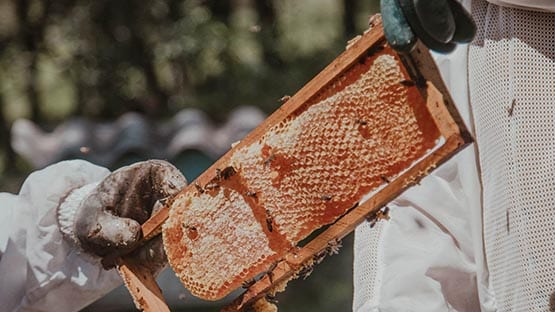
Thinking of setting up a personal beehive in your back yard? James M. Wilson, beekeeping expert for Virginia Tech and Virginia Cooperative Extension, has plenty of tips to offer about starting up and tending to a personal beehive.
Homeowners looking to venture into beekeeping have a lot to think about long before any potential honey harvest.
“The best way to determine whether to keep bees is to meet with beekeepers at an organizational meeting, not just at the farmer’s market where they are hoping to sell their honey,” said Wilson. “Local, regional and state beekeeper associations hold meetings that cover a great deal of topics on bees and bee products.
“Ask about or listen to the challenges of keeping bees, because when they arise, they can be formidable. It may be that keeping a native bee house or nest in your yard might be more of what you are looking for in terms of pollination or curiosity.”
The checklist includes acquiring the right equipment, access to good sources for food and water, investigating the use of pesticides by neighbors and many additional considerations.
“If you are interested in serious pollination benefits and a sweet taste of honey as a payoff, honeybees are a great place to get started,” said Wilson. “Being a beekeeper requires optimism that you and your bees can succeed, stubbornness to work through the challenges, and some realism to know that you will at times need to make some tough decisions about your bees. The rewards often do pay off, but they may not come as soon as you think.”
Location is one of your top priorities when you are getting started keeping bees, Wilson said.
“Important factors include early morning sun in the spring, windbreaks, good air and water drainage, and nearby forage and water sources. Also, think about what having more bees in your area will look like – will you have to redirect them from foraging in a popular public park?”
Wilson said that bee supply companies sell the basic kits for hives as well as personal protective equipment.
“We want to make sure that we are setting the bees up for success, so having equipment assembled, painted and a location prepped will help you to install your new package or nucleus colony of bees and let them get right to work,” Wilson said. “They have a big job to do to get ready for their first winter, so we do not want to slow them down at all.”
Wilson teaches classes on bees and insects at Virginia Tech, maintains the university’s research and teaching beehives, and advises the student Beekeepers club.










